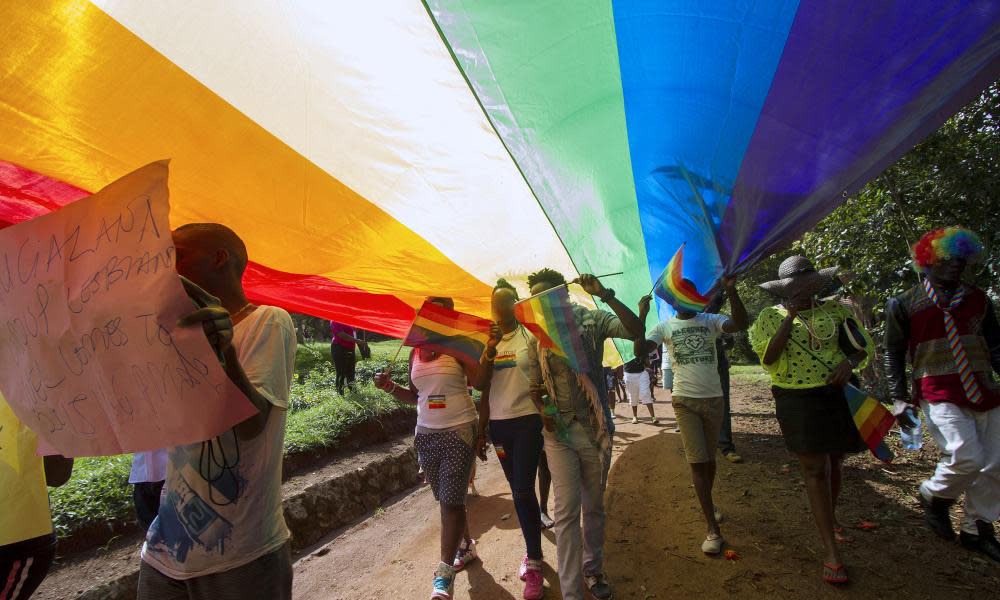Pride Uganda has been crushed. Please don’t look away | Frank Mugisha

Since 2012 we have celebrated Pride in Uganda. Our Pride is very different to the Pride parades in London or New York. Rather than hundreds of thousands, we have a few hundred LGBT Ugandans, and our friends who sympathise with our struggle, attending our event. We usually keep away from big public crowds and public places to avoid confrontations.
The Ugandan authorities have consistently refused to acknowledge Pride Uganda, and they have always misrepresented it: in 2012, for example, our Pride was raided by the police on the grounds that we were holding a “gay wedding”. In the next few years we held more low-profile events without problems – but last year our Pride week was cut short when police raided one of our events. I and my colleagues were brutally arrested and detained.
This year we told the police about our intention to hold Pride, although we do not necessarily need permission. The police were evasive about granting permission. We wanted to ensure a peaceful Pride week, but even more we wanted an honest, open event that wouldn’t be misrepresented by the government. We even held a meeting with Uganda’s minister of ethics and integrity, Simon Lokodo, to try to explain why Pride was so important to us.
And it really is. It gives LGBT people a moment of happiness and peace denied us the rest of the year. It offers a reprieve from lives spent hiding and avoiding suspicion, a chance for people to be themselves and celebrate each other.
But Pride 2017 was crushed. Our efforts to engage with the state fell on deaf ears. Lokodo threatened us with arrest, even violence, and the police were reportedly ready to surround the venues we had booked. The event was meant to begin last week, on 16 August. But we were left with no choice but to cancel. Our community is still traumatised by the arrests and detentions that took place last year. We couldn’t risk a repeat.
Some Ugandans view homosexuality as western. In some of our discussions it was suggested that perhaps we should rebrand Pride Uganda as something more acceptable, something that resonates better with Uganda and Ugandans. The authorities, and even some Ugandans who are sympathetic to our cause, have expressed different opinions about the struggle for LGBT rights in Uganda; Lokodo has consistently denied that we have any rights. Some have urged us not to “promote”, “recruit” or have “exhibitions” of homosexuality. And sadly too many Ugandans believe homophobic myths that are often peddled by evangelical Christians – myths that have been debunked in many other countries.
Before evangelicals came here, Ugandans did not equate homosexuality with such words as “promotion”, “exhibition” and “recruiting”. Now it’s said we’re trying to “recruit” an army of homosexuals or supposedly asking children to become homosexual “to take over the heterosexuals”; “exhibitions” constitute any organised events, such as Pride, workshops and meetings, and “promotion” any form of advocacy.
Even with all that’s going on in Uganda, Lokodo and other government officials still deny any persecution; but sometimes I think there’s almost a right to persecute LGBT Ugandans, that even speaking about the subject is seen as crying foul to the international community, or being unpatriotic. But what do you do when a majority of Ugandans will not support or openly defend the rights of a minority group? Do not doubt the ongoing persecution of LGBT Ugandans. Daily my organisation seeks to provide solace and comfort to LGBT people who have been tormented by the state, their landlord, their boss, their families.
The international community has been so helpful in supporting the LGBT struggle in many countries in Africa – Uganda among them – but working with foreign embassies is not easy. There has been huge support in the past, it’s true, but since the invalidation of the Anti-Homosexuality Act in 2014 we have seen less and less interest from civil society and the diplomatic community – which is ironic, as many Ugandans think foreign embassies offer the LGBT community a red carpet. In fact, I know many LGBT Ugandans who have been denied visas to western countries on the grounds that they would try to avoid returning to Uganda because of my country’s history of persecution of LGBT people.
And now we’re being told by some embassies that open support for our struggle would be counter-productive. Recently I sat with a diplomat who said his country could not fund my organisation for fear that Uganda would accuse them of promoting homosexuality. I am not saying that we need leverage over Uganda – but we do need to keep dialogue open, especially now when we’ve been forced to cancel Pride and our freedom of assembly has been denied.
It took the murder of my friend David Kato and the threat of the death penalty against LGBT people for the international community to take notice of our plight. Now it feels like the LGBT community is becoming invisible again, and not just to Ugandan society. We need the British government, the EU and the US to keep talking to the Ugandan government. We need the persecution of LGBT people to be on the agenda of the Commonwealth heads of government meeting next year. And we urge the EU to appoint a special representative on LGBT rights. The fact that we have been forced to cancel Pride Uganda is one more sign of our growing invisibility.
• Frank Mugisha is director of Sexual Minorities Uganda

 Yahoo News
Yahoo News 
